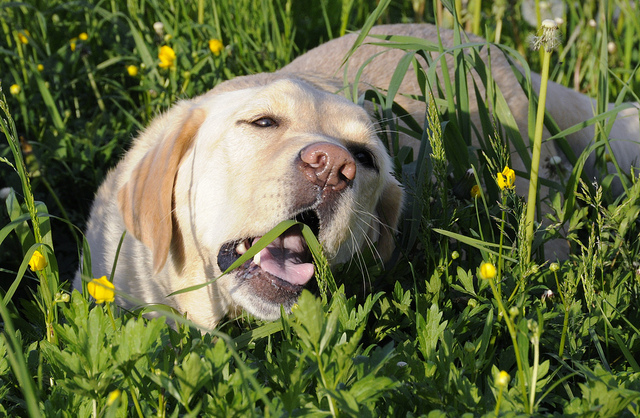Why Does My Dog Eat Grass?
By Karen Becker
If your otherwise healthy, well-nourished dog nibbles on selected grass once in awhile, there’s no cause for concern. Unless, of course, the grass has been treated with chemicals (pesticides, insecticides, fertilizers, etc.). You definitely don’t want your precious pooch ingesting toxins with her grass snack.
Dogs that selectively choose specific grasses to nibble on may be seeking out the plant’s medicinal qualities (many grasses are high in potassium and enzymes) or looking for a natural source of fiber. But then there are the frantic, non-selective grass eaters, which may mean a GI problem is brewing.
Dogs will instinctively search for natural remedies for the occasional upset stomach, and grass often does the trick, not to mention it’s usually easy to find. There is something about the texture of grass that triggers vomiting or a bowel movement in many dogs, which relieves tummy discomfort. But if the grass eating is chronic and especially if it causes your pet to vomit frequently, it’s time to make an appointment with your veterinarian.
In the meantime, I recommend upgrading your dog’s diet if she’s still eating kibble or any non-human grade commercial dog food. Most healthy dogs fed a balanced, species-appropriate diet don’t eat grass because they receive all the nourishment their bodies need from their food, and they rarely suffer from digestive issues. Adding probiotics and digestive enzymes can also benefit dogs with “sensitive stomachs.”
If you’re sure your dog is receiving optimal nutrition from a species-appropriate diet but she still eats a notable amount of grass, consider growing your own sunflower sprouts. Sprouts can provide an easy, inexpensive source of fresh, live, organic vegetation and are much more nutritious for your pet than grass.



Learn how I trained my dog in just a week after my neighbors were complaining
ReplyDeleteabout him. Click Here To Train Your Dog At Home